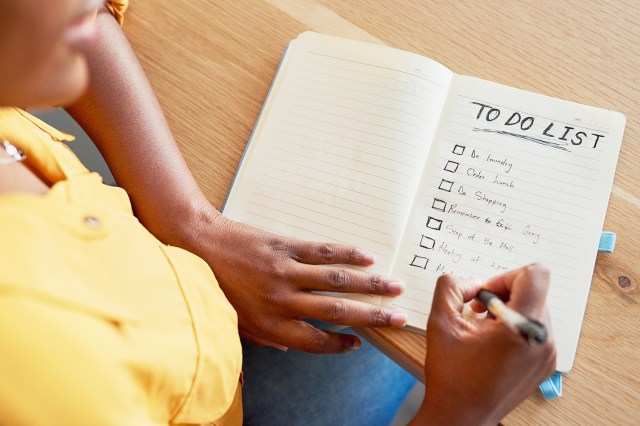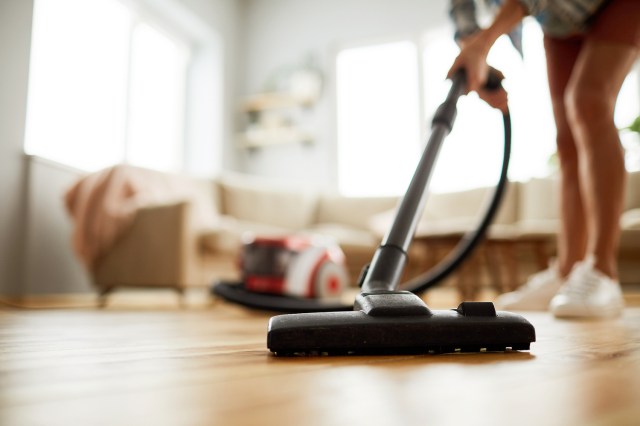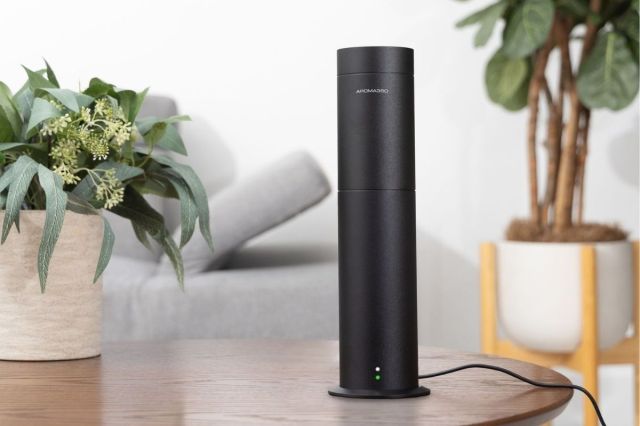Between work, personal appointments, deadlines, social events, and daily chores, staying organized quickly becomes overwhelming. Unfortunately, there’s no magic wand we can wave to fix the chaos when schedules are overbooked and to-do lists run over. But you can adopt a few easy tips to improve your organization. While these tricks might seem small at first, over a week or a month, these daily habits can make a big difference, leaving you feeling more empowered to tackle your busy life.

Declutter Your Brain
Have you ever had so many thoughts, tasks, and ideas swirling around in your mind that you don’t know where to begin? You aren’t alone. One of the best ways to start your organization journey is to declutter your brain. Use a journal, calendar, or to-do list — or all three — to organize all your tasks, events, and thoughts in one place. This will free up valuable space in your brain and reduce your risk of cognitive overload, which happens when your working memory receives more information than it can handle. You’ll be able to better focus on the task at hand while being less likely to forget things because they are already written down. Completing a to-do list also gives us a sense of satisfaction, and we’re more likely to return for more the next day, excited to complete another list.

Have a “Chore of the Day”
Organize your weekly cleaning list by having a set household chore for each day, keeping the schedule consistent from week to week. For example, Monday could be laundry day, Tuesday is dusting, Wednesday is vacuuming, and so on. Write these chores down on your daily calendar so that you remember to do them, and by the end of the week, your home will be spick-and-span.

Schedule Downtime
If your daily disorganization is getting out of hand, try time blocking. This method of schedule organization creates a time slot for everything, including your daily downtime (reading, gaming, television, social media, etc.). For example, you might have two time blocks for answering emails — 9:30 to 10:00 a.m. and 4:00 to 4:30 p.m. — so you aren’t constantly checking your email throughout the day. You can even set timers to notify you when each block is up. Anything that isn’t done can be moved to a free block for unfinished tasks at the end of the day or reassigned to the following day.
Reader Favorites

Tidy Your Workspace
Organization and cleanliness go hand in hand. Before you start your workday, take five to 10 minutes to straighten out the space around you and create a clean work environment. This can mean wiping down your desk, removing an old coffee mug, filing papers, or putting away excess clutter. A 2020 study by Pepperdine University showed that tidying a workspace had many perceived benefits, including improved focus, productivity, and efficiency. It also increased creativity, joy, motivation, and mental clarity while decreasing anxiety. All of these things work in tandem to support good organizational skills.

Use the 60-Second Rule
If a task will take less than 60 seconds, do it now instead of putting it off until later. This goes for anything at work or home, whether scheduling a doctor’s appointment, putting a file back where it came from, or signing your child’s permission slip. Because these types of tasks are so short and simple, they won’t derail the rest of your schedule for the day, and it will be one less thing for you to remember to do. If the task will take longer than 60 seconds, add it to your ongoing list of to-dos so you don’t forget about it and return to it later.

Curate Your To-Do List Before Bed
Set aside time at night to quickly review what needs to be done the next day so that you can hit the ground running in the morning. If you have kids, doing this after dinner as a family may be beneficial to ensure everyone has everything ready before the next day begins. This list can be as granular as you’d like (e.g., outfits, lunch plans, etc.), but don’t forget time-sensitive things such as appointments, work tasks, and errands, listing them in order of importance. According to a Baylor University study, working on a to-do list before bed might even help you get a better night’s rest. Participants who wrote to-do lists before bed fell asleep faster than those who didn’t write one, suggesting that mental offloading and getting organized helped ease anxiety about the next day’s tasks.
Featured Image Credit: luza studios/ iStock
More From Our Network
Better Report is part of Inbox Studio, an email-first media company. *Indicates a third-party property.
















